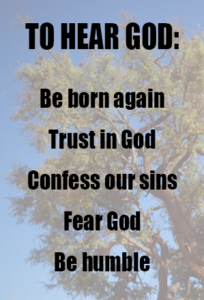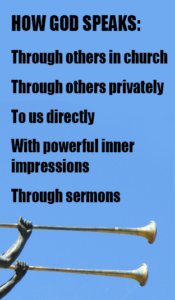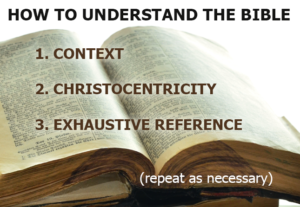Hearing God
As Christians, we not only think about and plan for the year ahead, we seek God’s counsel and approval… don’t we? But how do we expect Him to respond to us when we ask?
The comedian Lily Tomlyn once quipped; “Why is it that when we speak to God we are said to be praying, but when God speaks to us we are said to be schizophrenic?” Perhaps there is some truth in this because unsaved people generally accept prayer as a socially acceptable practice, but tend to regard people who claim to ‘hear God’ as distinctly strange. However, the Lord spoke to Peter, and Paul, and countless other biblical characters, so what’s strange about hearing God? In my experience, though, many Christians do not experience God speaking to them in any direct and clearly identified way.
In verse five of Psalm 25 David writes, ‘guide me in your truth and teach me, for you are God my saviour’. So, David’s expectation of hearing God was based on the fact that he was in a saving relationship with the almighty. The Hebrew word he used here for ‘saviour’ leads us to Jesus. When the angel appeared to Mary he said, “You are to give him the name Jesus, because he will save his people from their sins” (Matthew 1:21). Now the name Jesus is a Greek form of Joshua, which comes from the same Hebrew word for ‘saviour’ that David used in his psalm. This Jesus, this saviour, is recorded in John 3:3 as saying to the Hebrew scholar Nicodemus; “I tell you the truth, unless a man is born again he cannot see (perceive, discern) the Kingdom of God”. Then He went on to say, “You must be born again”. The foundational basis for hearing God is the spiritual rebirth into a saving relationship with the triune God in and through the Lord Jesus Christ. If we are to hear Him then we need to be born again.
 The words ‘born again’ are not just code for church membership or a commitment to live a good life, but rather express a metaphysical reality. You see, thanks to Adam and Eve, all people are born physically into this world spiritually dead to God. To relate to God, who is a spiritual being, our dead spirits must be ‘born again’ from above. I use the word metaphysical because it expresses something beyond and transcending the physical. You see, Christianity is not a system of behaviour, religious ritual, philosophy, or social dynamics; it is a spirit-to-spirit relationship between Jesus and His disciples. I am making this point so definitely, because there are many in our churches who adhere to a Christian religious world-view, and have even been brought up in Christian-type homes, yet have never asked the Holy Spirit to give them new spiritual life in Jesus’ name. These same folk are often the ones who don’t hear God, no matter how hard they pray.
The words ‘born again’ are not just code for church membership or a commitment to live a good life, but rather express a metaphysical reality. You see, thanks to Adam and Eve, all people are born physically into this world spiritually dead to God. To relate to God, who is a spiritual being, our dead spirits must be ‘born again’ from above. I use the word metaphysical because it expresses something beyond and transcending the physical. You see, Christianity is not a system of behaviour, religious ritual, philosophy, or social dynamics; it is a spirit-to-spirit relationship between Jesus and His disciples. I am making this point so definitely, because there are many in our churches who adhere to a Christian religious world-view, and have even been brought up in Christian-type homes, yet have never asked the Holy Spirit to give them new spiritual life in Jesus’ name. These same folk are often the ones who don’t hear God, no matter how hard they pray.
To be born again is the first condition for hearing God, and verse 2 of Psalm 25 gives the second condition; ‘In you I trust, O my God’. Now, if you do not trust God, then why would you want Him to guide you, and why would you follow His guidance even if He did speak to you? Our trust in God is based on our firm belief that, as David said, ‘No one whose hope is in you will ever be put to shame’ (vs. 3). Jesus revealed that God the Father is merciful, loving, and truthful. Therefore, we know that He can be trusted, that He is not playing cosmic chess with us in which we are the pawns, and that He will not set us up just to witness our humiliation.
Verses 7 and 11 of Psalm 25 point us to the next condition for hearing God – confession of known sin. Surely if we are consciously disobeying what He has already made clear in His Word then we should not expect to hear anything more direct from Him other than perhaps, “Own your sin, confess it and repudiate it, and change.”
A fourth condition for hearing God appears in verse 14, ‘The Lord confides in those who fear Him’. Proverbs 14:27 has ‘the fear of the Lord is a fountain of life turning a man from the snare of death’. To fear God is to revere, honour, take Him seriously, and avoid offending Him, and that means doing what He says when we do hear Him. Jesus said, “Why do you call me ‘Lord, Lord’ and do not do what I say?” (Luke 6:46). And this leads to a fifth condition for hearing God, humility. ‘He guides the humble in what is right and teaches them His way’ (Psalm 25:9).
So much then for the conditions for hearing God, but the big practical question is ‘how should we expect to hear Him’?
In the past, God spoke through prophets in many different ways, and King David had first-hand experience of this when the prophet Nathan confronted him. Today, should we not also expect to hear God through genuine prophecy? Is this not what Paul taught when he wrote, “desire spiritual things, especially prophecy”? (1 Corinthians 14:1). But what forms does prophecy take in the church of our day?
God speaks to us:
- Through prophecy, which can be in direct words of strengthening, encouragement, and comfort spoken out during a church gathering (1 Corinthians 14:3).
- Privately, one-to-one when the whole church is not involved.
- Through direct words from the Holy Spirit in our quiet times, or from Bible texts that come alive to us as we read them, or though dreams and visions.
- Through powerful inner impressions and thoughts that appear in our minds with unexpectedly compelling power.
- In our preaching, for in its purest form preaching is the forth-telling of the Word of God.
 We need to make space for all this in our church services and in our private times with the Lord, but at the same time we must test all things. Paul wrote in 1 Thessalonians 5:19-21; ‘Don’t put out the Spirit’s fire; do not treat prophecies with contempt. Test everything. Hold on to the good. Avoid every kind of evil.’ And how do we test everything? Against the Word of God, that is the Bible as understood through the lens of Jesus’ life, teachings, and revelation of the nature and character of the triune Godhead.
We need to make space for all this in our church services and in our private times with the Lord, but at the same time we must test all things. Paul wrote in 1 Thessalonians 5:19-21; ‘Don’t put out the Spirit’s fire; do not treat prophecies with contempt. Test everything. Hold on to the good. Avoid every kind of evil.’ And how do we test everything? Against the Word of God, that is the Bible as understood through the lens of Jesus’ life, teachings, and revelation of the nature and character of the triune Godhead.
King David articulated the positive results of hearing God when he wrote; ‘Who then is the man that fears the Lord? He will instruct him in the way chosen for him. He will spend his days in prosperity, and his descendants will inherit the land. The Lord confides in those who fear him; he makes his covenant known to them’ (Psalm 25:12-14).
Podcast: Play in new window | Download



 Have you ever wondered if Jesus was really born on the 25th December?
Have you ever wondered if Jesus was really born on the 25th December?

 And to crown it all, at dawn of that date Jupiter was in the constellation of Virgo, the virgin. During their journey from Babylon to Jerusalem, Jupiter would have appeared to be literally going before them and they would have followed it in a westerly direction. Just imagine their delight and wonder when the wandering ‘star’ stopped in the heavens directly above Bethlehem, the ancestral home of the royal family of David, and the very place indicated by Herod’s theologians.
And to crown it all, at dawn of that date Jupiter was in the constellation of Virgo, the virgin. During their journey from Babylon to Jerusalem, Jupiter would have appeared to be literally going before them and they would have followed it in a westerly direction. Just imagine their delight and wonder when the wandering ‘star’ stopped in the heavens directly above Bethlehem, the ancestral home of the royal family of David, and the very place indicated by Herod’s theologians.




 Perhaps I should give an example of these two types of ‘interpretation’: The story that Jesus told of the good Samaritan has often been interpreted allegorically. Some teachers have claimed that the two coins given to the innkeeper to provide for the injured man’s board and lodging stand for baptism and holy communion. The idea being that these are the two ordained church provisions for the ‘sinner’. But there is no end to what the two coins could be taken to represent; Old and New Testaments, Apostles and Prophets, and so on. The problem is, of course, that the original context of the passage plays little role in this form of interpretation, and nor does the first intended meaning.
Perhaps I should give an example of these two types of ‘interpretation’: The story that Jesus told of the good Samaritan has often been interpreted allegorically. Some teachers have claimed that the two coins given to the innkeeper to provide for the injured man’s board and lodging stand for baptism and holy communion. The idea being that these are the two ordained church provisions for the ‘sinner’. But there is no end to what the two coins could be taken to represent; Old and New Testaments, Apostles and Prophets, and so on. The problem is, of course, that the original context of the passage plays little role in this form of interpretation, and nor does the first intended meaning.
 In the majority of cases, the context of a text yields its fundamental meaning, in other words;
In the majority of cases, the context of a text yields its fundamental meaning, in other words; 

 On the one side, the arguments often devolve into “God’s Word says so, so that’s the way it is” statements, and on the other side the many references to quasars, the speed of light, quantum mechanics, and so on can be a little overwhelming. Debaters tend to argue at length (Pun intended once more) whether the meaning of the word translated as ‘day’ in Genesis Chapter One can indicate a long period instead of a 24-hours. Ken Ham accuses Old Earth Creationists of arguing from the basis of science and then trying to make the biblical account conform to the so-called evidence. Dr. Ross, however, claims that he is equally committed to the inspiration and authority of the Bible, but that he sees no conflict between a reasoned interpretation of the scriptures and the scientific evidence. But is the real driving issue the matter of WHEN God created? Is it really? I don’t think so.
On the one side, the arguments often devolve into “God’s Word says so, so that’s the way it is” statements, and on the other side the many references to quasars, the speed of light, quantum mechanics, and so on can be a little overwhelming. Debaters tend to argue at length (Pun intended once more) whether the meaning of the word translated as ‘day’ in Genesis Chapter One can indicate a long period instead of a 24-hours. Ken Ham accuses Old Earth Creationists of arguing from the basis of science and then trying to make the biblical account conform to the so-called evidence. Dr. Ross, however, claims that he is equally committed to the inspiration and authority of the Bible, but that he sees no conflict between a reasoned interpretation of the scriptures and the scientific evidence. But is the real driving issue the matter of WHEN God created? Is it really? I don’t think so.
 The how and when of it only becomes important to me if it impacts on core Christian doctrines such as sin, spiritual death, salvation, and so on. Young Earthers do debate these issues as well, but not well, and nothing I have read or heard has even come close to convincing me that the biblical record is not entirely trustworthy when it sets out these truths… and everything else for that matter. And I don’t need to hold a Young Earth position to believe these doctrines.
The how and when of it only becomes important to me if it impacts on core Christian doctrines such as sin, spiritual death, salvation, and so on. Young Earthers do debate these issues as well, but not well, and nothing I have read or heard has even come close to convincing me that the biblical record is not entirely trustworthy when it sets out these truths… and everything else for that matter. And I don’t need to hold a Young Earth position to believe these doctrines.
